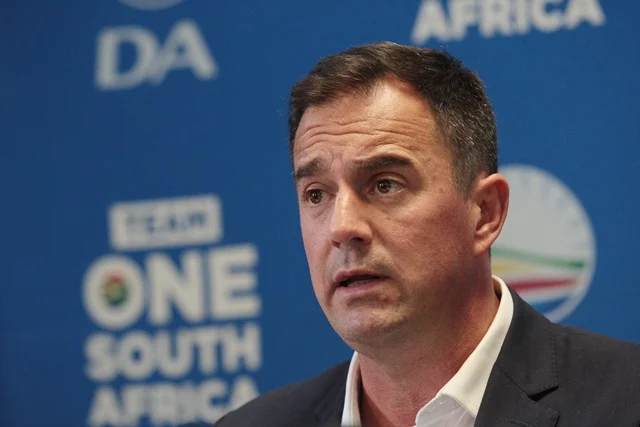Cancel SAA’s R16.4bn bailout, use money for disaster management – DA
The party proposed several measures to mitigate the pandemic's effect on the economy, which they will present to President Cyril Ramaphosa.

DA leader John Steenhuisen. Picture: Veli Nhlapo
A four-month forbearance on loans and rentals for businesses, as well as cancelling SAA’s R16.4 billion bailout and rather allocating this money to disaster management, are a few of the proposals the DA will make to President Cyril Ramaphosa to mitigate the dire economic effects of the coronavirus pandemic.
DA interim leader John Steenhuisen and several colleagues addressed the media on Tuesday on what Steenhuisen called a “matter of pivotal, national importance”.
Steenhuisen said he convened a meeting with DA spokespeople and the premier of the Western Cape, Alan Winde, and the mayor of Cape Town, Dan Plato, on Monday.
He said the spokespeople would reach across the aisle and contact their relevant ministers to offer any assistance they could provide. They were also available to form part of ministerial task teams.
Each spokesperson had to find specific measures in their portfolio to mitigate the effects of the pandemic and to identify loopholes in the current measures which needed to be plugged.
“It has placed South Africa in uncharted waters, and now, more than ever, leadership, trust and cooperation are going to be vital in securing the safety of our nation, and ensuring the well-being of the people of South Africa,” the interim leader said.
Steenhuisen has also formed a committee which will meet regularly to exercise oversight over the announced response measures, and to offer “useful and innovative ideas and approaches that government at all levels can adopt in their response efforts”.
Steenhuisen will submit the DA’s recommendations to President Cyril Ramaphosa at Wednesday’s meeting with party leaders.
DA spokesperson on finance Geordin Hill-Lewis said: “Let there be no doubt, folks, that the health crisis we face will have an absolutely devastating impact on the South African economy.”
Hill-Lewis said they were concerned that there hadn’t been an announcement on economic support.
“But I think it is important to say that while it will be very bad – devastating – for the economy, we can get through this if we plan properly and if we have a clear set of plans for how we can support the economy,” he said.
“We absolutely can get through this.”
The DA proposes the following measures to mitigate the pandemic’s effect on the economy:
- A four-month loan forbearance for businesses;
- A four-month rental forbearance for small businesses;
- Pause in VAT, UIF and Worker’s Compensation Fund payments. Outstanding VAT refunds should be paid to businesses urgently, and new VAT payments should be deferred to later this year;
- Business rescue proceedings should receive an automatic three-month extension beyond the three months provided for in S132 of the Companies Act;
- and SAA’s R16.4 billion bailout should be cancelled immediately and the budget amended to allocate this money to disaster management. The minister should also urgently clarify what funds are available in the National Disaster Management Fund.
DA spokesperson on health Siviwe Gwarube outlined the DA’s proposed health mitigation strategies, which include:
- The private sector should pledge further resources to fight Covid-19;
- The Department of Health (DoH), through additional funds that must be made available, should source additional Covid-19 screening and testing;
- Extend screening and testing capacity through the coordination of the National Institute for Communicable Diseases, the National Health Laboratory Service and private laboratory services;
- The DoH should urge retired healthcare professionals to come out of retirement voluntarily to be deployed to screening hotspots and managing public queries on the public hotline. The DoH should also be reaching out to medical students who can provide the service over and above their training;
- Health and safety officials who fall within the local government structures should be deployed to shopping centres and places of high frequency to ensure that businesses are complying with the basic requirements of protecting their staff members and the public
Western Cape MEC for agriculture and DA interim national chairperson Ivan Meyer said Winde had put in place a central provincial structure to monitor and mitigate the Covid-19 virus.
The provincial Joint Operations Centre had been activated two weeks ago and was operational around the clock.
Local governments across the Western Cape have action plans and outbreak response teams are in place.
The Western Cape government is briefing various sectors, including sporting, cultural and religious bodies.
On Tuesday morning, Meyer closed the Elsenburg Agricultural Training Institute from 18 March until 14 April as a precautionary measure.
City of Cape Town MEC for health Zahid Badroodien said the city had closed all public facilities, such as pools and halls, withdrew permits for previously approved events and stopped non-essential travel for officials.
Cape Town’s MyCiTi buses would no longer allow more than 20 people per bus.
Steenhuisen said the party had also suspended all political meetings across the country. Their policy conference will take place in September, and the elective conference in late October or early November.
For more news your way, download The Citizen’s app for iOS and Android.







